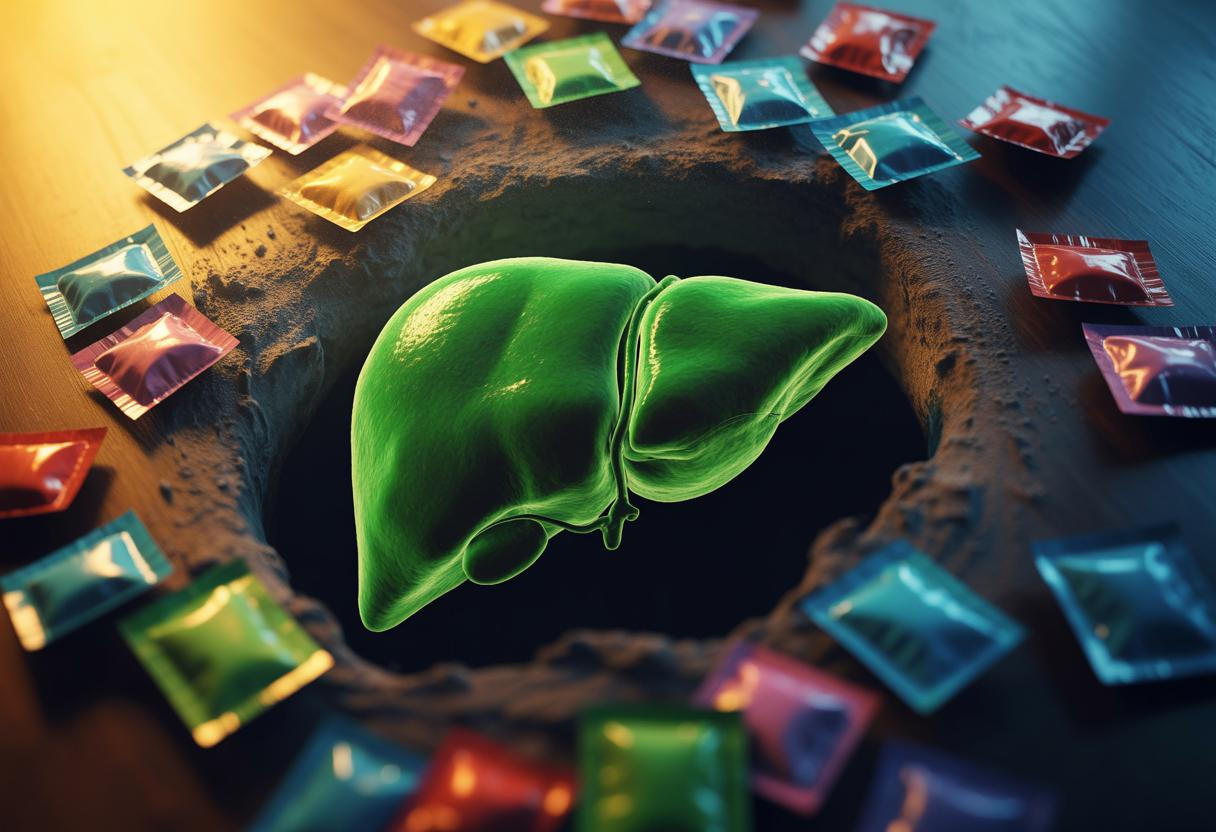Hidden beneath the innocent-looking labels of “sugar-free” and “diet” products lurks a silent liver destroyer that disrupts your body’s natural detoxification system more effectively than sugar ever could. Recent 2025 research reveals artificial sweeteners like aspartame and sucralose don’t just trick your taste buds—they systematically damage the liver’s ability to process toxins by inhibiting P-glycoprotein activity, a critical detox pathway most people have never heard of.
While millions reach for artificially sweetened beverages believing they’re making the healthier choice, emerging science paints a drastically different picture of what’s happening inside their bodies.
The hidden threat in your daily routine
Unlike sugar’s well-documented effects, artificial sweeteners operate through a more insidious mechanism. They don’t cause immediate symptoms, making their liver damage nearly impossible to detect until significant harm has occurred. A groundbreaking 2024 study found that people consuming just one artificially sweetened drink daily had more than double the risk of chronic liver disease mortality compared to those drinking three or fewer per month.
The World Health Organization responded to mounting evidence by advising against non-sugar sweeteners in 2023, citing increased risks for cardiovascular disease and all-cause mortality. Yet these ingredients remain ubiquitous in thousands of products, from diet sodas to “healthy” protein bars.
What makes this particularly concerning is how natural liver detoxification and healing processes become compromised when P-glycoprotein function is disrupted, creating a cascade of metabolic dysfunction.
The molecular sabotage happening in your liver
P-glycoprotein disruption: your liver’s security system fails
Artificial sweeteners block P-glycoprotein, a protein that acts like a molecular security guard in your liver cells. This protein normally identifies and expels toxins before they can cause damage. When artificial sweeteners disable this system, toxins accumulate, leading to inflammation and cellular damage that progresses silently over years.
Research shows this disruption affects not just liver function but also how your body processes medications, potentially making prescription drugs less effective or more toxic.
The supplement connection most doctors miss
Beyond artificial sweeteners, a 2024 JAMA study revealed that 4.7% of American adults regularly consume herbal supplements containing liver-damaging botanicals like turmeric extract, green tea concentrate, and garcinia cambogia. These “natural” ingredients can cause acute liver injury, yet most consumers remain unaware of the risks.
Unlike traditional dietary patterns and metabolic health approaches that support liver function, these concentrated extracts overwhelm the organ’s processing capacity.
Recognizing the early warning signs
The challenge with liver damage from these hidden ingredients is that symptoms appear only after significant harm has occurred. However, certain subtle changes can signal problems: unexplained fatigue, difficulty metabolizing medications, persistent digestive issues, and changes in how your body responds to alcohol or caffeine.
Regular liver enzyme testing becomes crucial for anyone consuming artificial sweeteners daily or taking herbal supplements. AST and ALT levels can reveal liver stress before irreversible damage occurs.
Protecting yourself from hidden liver threats
Immediate dietary changes
Replace artificially sweetened products with naturally flavored alternatives. Water infused with fresh fruits provides sweetness without the liver-damaging compounds. When craving sweet treats, opt for small amounts of natural sugars rather than their artificial counterparts.
Supplement safety protocol
Before taking any herbal supplement, research its hepatotoxicity profile and consult healthcare providers. Many people assume “natural” means safe, but concentrated plant extracts can be more liver-toxic than synthetic compounds.
Consider incorporating omega-3 rich alternatives to support liver health naturally, as these nutrients help reduce inflammation and support cellular repair.
Monitoring and prevention
Request liver function tests annually if you regularly consume diet products or supplements. Early detection allows for intervention before permanent damage occurs. Additionally, supporting your liver with adequate hydration and limiting processed foods helps maintain optimal detoxification function.
Your liver’s future depends on today’s choices
The liver’s remarkable ability to regenerate makes recovery possible when harmful exposures are eliminated early. By recognizing artificial sweeteners and unregulated supplements as the hidden threats they are, you can make informed decisions that protect this vital organ. Your liver processes over 500 functions daily—it deserves protection from these silent saboteurs masquerading as healthy alternatives.
